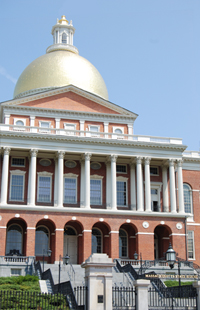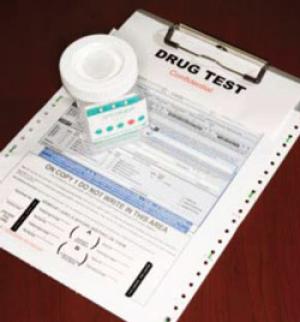The White House has released its proposed 2013 federal drug budget, and it looks pretty much like all the other federal drug budgets, only bigger.
Bills to legalize medical marijuana have been filed (or are about to be filed) in 18 states, and advocates point to three or four of them that are looking like they have a particularly good chance of passage.
The former general who is Guatemala's new president is speaking out again on drug legalization.
Voters in Washington state will decide whether to legalize marijuana on the November ballot -- and they may not be alone.
A Detroit initiative that would legalize the possession of up to an once of pot by adults in private appears to be headed for a summer vote after the state Court of Appeals overturned a lower court decision blocking it.
Medical marijuana patients are taking to the streets Thursday, Feb. 16, to protest the Obama administration's clampdown on medical marijuana across the country. And then, there's the action at the state and local level.
Delaware's governor has pulled the plug on the state's medical marijuana dispensary program in the face of threats from the US Attorney.
Bills to drug test welfare and other public benefits recipients were blocked in South Dakota and Virginia after state officials warned against such legislation.
The Mexican army has made a massive methamphetamine bust, seizing 15 tons of pure tweak with a US street value of $4 billion.
A 28-year-old Iowa man has died after apparently falling from an apartment balcony as he tried to evade police during a drug raid.
A state trooper transporting marijuana, a pair of cops ripping off drug cash, a constable smuggling across the Mexican border, and a cop with a bad pain pill habit make this week's hall of shame.
Events and quotes of note from this week's drug policy events of years past.
The Obama administration this week released its Fiscal Year 2013 National Drug Control Budget, and it wants to spend nearly $26 billion on federal anti-drug programs. Despite all the talk about the staggering federal debt problem and current budget deficits, the administration found nothing to cut here. Instead, the proposed budget increases federal anti-drug funding by 1.6% over fiscal year 2012.

Drug War Autopilot and Co-Autopilot: ONDCP Director Gil Kerlikowske with President Obama
The proposed budget is remarkable for how closely it hews to previous years, especially in regard to the allocation of resources for demand reduction (treatment and prevention) versus those for supply reduction (domestic and international law enforcement and interdiction). The roughly 40:60 ratio that has been in place for years has shifted, but only incrementally. The 2013 budget allocates 41.2% for treatment and prevention and 58.2% for law enforcement.
"This is very much the same drug budget we've been seeing for years," said Bill Piper, national affairs director for the
Drug Policy Alliance (
DPA). "The Obama drug budget is the Bush drug budget, which was the Clinton drug budget. Little has changed."
"It's really just more of the same," said Sean
Dunagan, a former DEA intelligence analyst whose last assignment in northeastern Mexico between 2008 and 2010, a when prohibition-related violence there was soaring, helped change his perspective.
Dunagan quit the DEA and is now a member of
Law Enforcement Against Prohibition (LEAP).
"There are very minor adjustments in how the drug spending is allocated and bit more money for treatment, but there's a significant increase in interdiction, as well as a $61 million increase for domestic law enforcement,"
Dunagan noted. "They're trying to argue that they're abandoning the drug war and shifting the focus, but the numbers don't really back that up."
The proposed budget also demonstrates the breadth of the federal drug spending largesse among the bureaucratic fiefdoms in Washington. Departments that catch a ride on the drug war gravy train include Agriculture, Defense, Education, Health and Human Services, Homeland Security, Housing and Urban Development, Interior, Justice, Labor, State, Transportation, and Veterans' Affairs, as well as the federal judiciary, District of Columbia courts, the Small Business Administration, and, of course, the
Office of National Drug Control Policy (
ONDCP -- the drug czar's office).
"It's just the same old programs being funded through the same old stove-pipes," said Eric Sterling, executive director of the
Criminal Justice Policy Foundation. "In a way, it's ironic. When Congress passed the legislation creating the drug czar's office in 1988, the idea was for the drug czar to look at all the federal anti-drug spending and come in and say he was going to take the funds from one program and shift them to a more effective program. I think many in Congress hoped he would shift resources from law enforcement to treatment and prevention because there was evidence that those sorts of programs were more effective and a better use of resources. That didn't happen," he said.
"The people who run the bureaucratic fiefdoms at Justice, Homeland Security, Defense, State and Treasury have
outmuscled the drug czar, and now the drug czar's budget announcements are reduced to public relations and spin," Sterling continued. "They take some $15 or $20 million program and bullet-point it as significant, but that's almost nothing when it comes to federal drug dollars."
The Justice Department alone would get $7.85 billion, up almost $400 million from FY 2012, with the Bureau of Prisons (BOP) and the DEA among those Justice components seeing funding increases. BOP spending would increase by about 8%, while the DEA budget would increase from $2.35 billion to $2.38 billion. On the other hand, the National Drug Intelligence Center in Johnstown, Pennsylvania, which lost its congressional patron with the death of Rep. John
Murtha (D-PA), has been zeroed out.
"The hundreds of millions of dollar increases in funding requested for the Federal Bureau of Prisons is particularly outrageous," said Sterling. "There are too many people doing too much time they don't need to be doing. Obama has the power to save hundreds of millions of dollars by commuting excessively long sentences. He could reduce the deficit and increase the amount of justice in America.
"He could tell the BOP he was ordering a cap on the federal prison population that now has a sentenced population of 198,000, Sterling continued, on a roll. "He could order them that whenever a new prisoner arrives, they have to send him the names of prisoners who may have served enough time for their crimes for him to consider for immediate release from prison. He could ask all the federal judges to send him the names of people they have sentenced to longer terms than they think are just. If he had the heart to reach out to those prisoners who are serving decades for minor roles and their suffering families, if he had the brains to put in place the means to achieve those cost-serving measures, and if he had the guts to actually use the constitutional power he has to do it, that would be great."
"That increase in incarceration spending really jumps out at me, too" said Dunagan. "To make their claim that they're not going to be locking up small-time dealers and users is pretty disingenuous."
Pentagon spending on interdiction and other anti-drug activities would decline somewhat, with the budget proposing $1.725 billion for 2013, a decline of $200 million from the 2012 budget. But interdiction spending goes up elsewhere, as Dunagan noted.
And State Department drug spending would take a hit. Spending would decline by just more than $100 million to $687 million, but most of that decrease would come from reduced funding for alternative development assistance, while State's other drug-related program, the Bureau of International Narcotics and Law Enforcement Affairs ("drugs and thugs"), would see only a $6 million decrease.
While funding for prevention and treatment would increase by 4.6% under the proposed budget, some treatment and grant programs are seeing cuts, while criminal justice system-based approaches are getting more money.
"I'm concerned that the budget seems to be emphasizing drug courts and criminal justice-based drug treatment," said Piper. "They're cutting SAMHSA, which funds a lot of treatment, but increasing spending for prison-based treatment."
The $364 million earmarked for SAMHSA's treatment programs is a $61 million reduction from FY 2012, while drug courts saw a $17 million increase to $52 million and BOP drug treatment programs saw a $16 million increase to $109 million.
The new drug budget also resurrects the drug czar's widely criticized National Youth Media Campaign, dropped last year when Congress failed to fund it.
"I'm also disappointed that they put back in funding for the drug czar's failed youth media campaign, which Congress eliminated last year," said Piper. "It's only $20 million, and you can hardly do a national media campaign with that, but still."
This is only the administration's budget proposal, of course, and Congress will have plenty of opportunities to try to cut (or increase) portions of it. Still, the proposed budget is a window on the thinking of administration that has talked the talk about how we are no longer in a war on drugs, but has taken only stumblingly tiny steps toward walking the walk. And drug reformers aren't liking what they're seeing.
"LEAP thinks this is misguided," said Dunagan. "The only thing that's different is the rhetoric used to spin it, and even that is a sort of tacit acknowledgment by the administration that people don't really like the drug war, but substantively, there's very little different from the past."
"Between the drug budgets and his war on medical marijuana, we're very disappointed in Obama," said DPA's Piper.
"We should be disappointed in the Obama administration," said Sterling. "There was supposed to be change. This was the University of Chicago law professor, the Harvard-trained lawyer, who was going to bring in his own people and make real change. I'm very disappointed in his drug policies and criminal justice policies. My disappointment with his policy failures don't have anything to do with the economic crisis or the geostrategic situation he inherited.
back to top
Since California voters made it the first medical marijuana state in 1996, other states have come on board at a rate a little better than one a year. Now, 15 years later, 16 states and the District of Columbia have effective medical marijuana laws, and by year's end, we could have 17, 18 or even more.

Connecticut State House
Especially in the early years, much of the movement toward medical marijuana came through the initiative process, with California followed by Alaska, Oregon, and Washington (1998), Maine (1999), Colorado and Nevada (2000), Montana (2004), Michigan (2008), and Arizona (2010). Washington, DC, could also be included on this list, since voters passed an initiative there in 1998, even though Congress wouldn't allow it to actually happen until 2010.
While there are a number of states that allow initiatives left, those early victories have removed the low-hanging fruit. Medical marijuana initiative campaigns are underway in some of the remaining states, such as Massachusetts and Ohio, but increasingly -- and out of necessity in states without the initiative process -- patients, advocates, and activists have turned to the legislative process to pass medical marijuana bills. The first state to do so was Hawaii in 2000, followed by Vermont (2004), Rhode Island (2006), New Mexico (2007), New Jersey (2010), and Delaware (2011).
This year, legislation to allow for the use of medical marijuana has been (or will be) filed in 18 states. Some have good prospects of passage, some have been percolating for years but are still unlikely to pass this year, and some are a first stab at what are usually frustrating multi-year educational efforts.
The Chronicle talked to a number of people at national drug and marijuana reform groups to try to get a sense of where the prospects are best and what impact the Obama administration's crackdown in recent months could have at the state house. The early favorites look to be Connecticut, Illinois, Massachusetts, and New Hampshire.
"Connecticut has a good chance of becoming the next medical marijuana state," said Allen St. Pierre, executive director of
NORML. "Our Connecticut
NORML chapter is very active and helped get it decriminalized last year. This year, they have legislation already written and the governor lined up with a pen. Can Connecticut not only pass medical marijuana legislation, but actually implement it by July 1? It looks like it could happen," he said.
The
Drug Policy Alliance (
DPA) also thought Connecticut's chances were good this year. Jill Harris, the group's managing director for strategic initiatives, said it was working with the local group
A Better Way Foundation to get a bill passed there.
"A Better Way is on the ground there, and they are coming back with a bill this session," she said. "The governor is likely to support it this time."
"Connecticut is one of the states with the best chance," concurred Karen O'Keefe, state policy director for the
Marijuana Policy Project (
MPP). "Both chambers passed a medical marijuana bill there, only to see it vetoed. But the new governor looks to be on board; he sponsored the decriminalization legislation last year."
"Most recently, we've been involved with advocates in New Hampshire and Indiana," said Mike
Liszewski, policy director for
Americans for Safe Access. "The New Hampshire bill looks like it has a solid chance of getting adopted in some form, but Connecticut also looks like it has a good chance, and Massachusetts is one that could pass."

Illinois State House
"We have paid lobbyists or legislative analysts in Illinois, which I think has a good chance of passage, in New Hampshire, which also looks good, and Maryland, and we'll be working with
DPA in New York," said
MPP's O'Keefe.
"In New Hampshire, an overwhelmingly Democratic legislature passed it only to fall two votes shy of overturning a veto in 2009," said O'Keefe. "We're very excited that this time around, the House has already passed it, and now we're working on the Senate."
All of this legislative work will be taking place against the backdrop of DEA raids on dispensaries, threat letters from US Attorneys to state officials, and the specter of federal agents swooping in on staid, state-employed regulators.
The federal clampdown wasn't helping,
DPA's Harris said. "The more threatening the administration acts, the more difficult it is," she noted. "The argument that 'We can't do this because it's against federal law' is pretty potent," she said. "We've sent our legal staff to different states to testify that states can enact their own laws, but a lot of officials believe that notion that they can't do it because it's against federal law."
"We've seen this federal clampdown hurting with legislators," said
ASA's Liszewski. "We're seeing this have effects throughout the country. Even though some states are still moving forward, it really comes down to whether individual politicians are feeling brave and are willing to put the interests of patients above federal intimidation."
But for
MPP's O'Keefe the hostility emanating from the Obama Justice Department is nothing new and nothing especially intimidating.
"The federal government has, by and large, been hostile to medical marijuana since the first law was passed in 1996," she said. "Remember, the Clinton administration threatened doctors and had to be slapped down in federal court. Although there was a brief period where we thought Obama would live up to his pledge, federal policy has always been a challenge. It would be easier if the federal government was not so obstinate, but I don't think the federal attitudes are decisive."
Time will tell about that, but in the meantime, here are the states where passing medical marijuana is on the agenda at the statehouse [compiled via StoptheDrugWar.org's
Legislative Action Center,
MPP's medical marijuana legislation list, and the
Procon.org list of medical marijuana bills]:
[Editor's Note: This list does not include pending legislation to modify (for better or worse) existing state medical marijuana laws, symbolic measures in support of medical marijuana, or other medical marijuana miscellanea.]
Alabama

Massachusetts State House
Two bills are pending in Alabama.
House Bill 25, sponsored by Rep. Patricia Todd (D-Birmingham), would allow patients or caregivers to possess up to 2 ½ ounces of usable marijuana and six mature plants. It would create compassion centers to distribute medical marijuana, create a state ID card system, and provide protections regarding employment, housing, and child custody.
House Bill 66, sponsored by Rep. K.L. Brown (R-Jacksonville), would allow patients or caregivers to possess up to eight ounces of marijuana, allow for collective cultivation, create a state ID card system, and provide protections regarding employment, housing, and child custody. The bills have been referred to the Committee on Health.
Connecticut
No bill has been formally filed yet, but one is expected shortly. Medical marijuana passed the state legislature in 2007, only to be vetoed by then
Gov. Jodi
Rell (R), who is not around to veto legislation this year.
Idaho
Last month, Rep. Tom Trail (R-Moscow) introduced
House Bill 370, which would create state-regulated dispensaries to serve registered patients. The bill has been referred to the State Affairs Committee.
Illinois
House Bill 30, which was introduced last year by House Deputy Majority Leader Lou Lang (D-Skokie), would create a three-year pilot program allowing registered patients to grow up to six plants or obtain marijuana from state-regulated dispensaries. A similar bill passed the Senate in the 2009-2010 session, but
HB 30 fell shy during a floor vote in May 2011. Because Illinois has a two-year session,
HB 30 is still alive, as is its companion measure,
Senate Bill 1548, introduced by Sen. Bill
Haine (D-Alton). SB 1548 passed a Senate Judiciary Committee vote last year.
Indiana
Last month, Rep. Tom
Knollman (R-House District 55) introduced
House Bill 1370, which would allow patients to obtain marijuana from state-registered dispensaries. There is no provision for patients to grow their own. The bill has been referred to the Committee on Public Policy.
Iowa
Sen. Joe
Bolkcom (D-Iowa City) introduced
Senate File 266 in February 2011, and the bill was referred the Human Services Committee and then to a Human Services subcommittee that same month. Because Iowa has a two-year legislative session, the bill is still alive. It would allow patients to possess up to 2 ½ ounces of usable marijuana, obtained from growing up to six plants or by buying it at a nonprofit dispensary.
Kansas
Rep. Gail Finney (D-Wichita) introduced
House Bill 2330 a year ago this week, and it remains alive because Kansas has a two-year legislative session. It was referred to the House Committee on Health and Human Services a few days later, and had an informational hearing last month. The bill would allow registered patients to grow their own or buy it from state-registered dispensaries. Last month, Sen. David Haley (D-Kansas City), introduced identical legislation,
Senate Bill 354, which has been assigned to the Committee on Federal and State Affairs.
Maryland

New Hampshire State House
Last month, Del. Cheryl Glenn (D-Baltimore) introduced
House Bill 15, which would allow for patients to grow their own or obtain it at dispensaries. It is now before the Health and Government Operations & Judiciary Committees. Last week, Del. Dan
Morhaim (D-Baltimore County) filed two bills based on working group approved by the legislature last year.
House Bill 1024 would allow medical marijuana distribution only through university-affiliated hospitals, while
House Bill 1158 would allow distribution through registered dispensaries. Maryland has a medical marijuana law, but it does not allow for access to medical marijuana and it only provides for a defense in court -- not protection from arrest.
Massachusetts
In January 2011, Rep. Frank
Smizik (D-Brookline) introduced
House Bill 625, which would allow registered patients or their caregivers to possess up to four ounces of usable marijuana and up to 24 plants or to obtain their medicine from registered dispensaries. Senate President Pro
Tem Stan Rosenberg (D-Amherst) introduced a companion bill,
Senate Bill 1161 at the same time. The two bills were referred to the Joint Committee on Public Health and received hearings in July. Also, Sen. Thomas McGee (D-Lynn) introduced
Senate Bill 818, which would allow patients or caregivers to possess up to four ounces and 10 plants. It has been referred to the Joint Committee on the Judiciary. All three bills are still alive because the state has a two-year legislative session.
Mississippi
Last month, Sen. Deborah Dawkins (D-Pass Christian) introduced
Senate Bill 2252, which would allow allow qualifying patients to cultivate and use medical marijuana. The bill has been referred to the Senate Judiciary Committee, Division A.
Missouri
Last month, Rep. Mike Colona (D-St. Louis) introduced
House Bill 1421, which would allow people with a debilitating medical condition and a doctor's recommendation to possess up to one ounce of marijuana and seven plants (three mature) or obtain it from registered nonprofit dispensaries. The bill has had its first and second readings, but has not been referred to a committee.
New Hampshire
Sen. Jim Forsythe (
R-Strafford) has pre-filed Senate Bill 2994, which would allow the medical use of marijuana and permit a limited number of state-regulated dispensaries. The House approved a similar bill,
House Bill 442 eleven months ago on 221-96 vote. That bill is still alive because the state has a two-year legislative session.
New York
A year ago, Sen Tom Duane (D-Manhattan) introduced
Senate Bill 2774, which would allow pharmacies, nonprofits, and health departments to dispense marijuana cultivated by registered producers. Patients could not grow their own, but could possess up to 2 ½ ounces. The bill is still alive because of the state's two-year legislative session and was re-referred to the Senate Health Committee last month. Assembly Health Committee Chair Richard
Gottfried (D-Manhattan) last year introduced a similar bill,
Assembly Bill 7347, which passed the Assembly Health, Assembly Codes, and Ways & Means Committees in May and June 2011. It, too, is still alive.
Ohio
In April 2011, Rep. Kenny
Yuko (D-Euclid) introduced
House Bill 214, which would allow the medical use and cultivation of marijuana by qualified patients. The bill is still alive because of the state's two-year legislative session.
Oklahoma
A year ago, Sen. Constance Johnson (D-Oklahoma City) introduced
Senate Bill 573, which would remove criminal penalties for possession and cultivation of marijuana from patients and caregivers who cultivate marijuana for a patient’s medical use, upon a doctor's recommendation. The bill was referred to the Health and Human Services Committee and remains alive because of the state's two-year legislative session.
Pennsylvania
Sen.
Daylin Leach (
D-Norristown) introduced
Senate Bill 1003, in April, and Rep. Mark Cohen (D-Philadelphia) filed a companion bill,
House Bill 1653 in June. The bills would allow qualified patients to possess and grow their own medical marijuana, or obtain it from one of three dispensaries. SB 1003 was referred to the Senate Committee on Public Health and and
HB 1653 was referred to the House Health Committee. Both bills carry over because of the state's two-year legislative session.
West Virginia
A year ago this month, Rep. Mike
Manypenny (D-Morgantown) introduced
House Bill 3251, which would allow patients registered with the state to grow their own medical marijuana or obtain it from dispensaries. The bill has been referred to the House Judiciary Committee, and is still alive because of the state's two-year legislative session.
Wisconsin
Last month, Sen. Jon
Erpenbach (D-Middletown) introduced
Senate Bill 371, the Jackie
Rickert Medical Marijuana Act, and Rep. Mark
Pocan (D-Madison) introduced companion legislation,
Assembly Bill 475. The bills would allow patients registered with the state to possess and cultivate medical marijuana or obtain it from regulated dispensaries. The two bills have been referred to their respective health committees.
There you have it. Eighteen states that
could pass medical marijuana through the legislative process this year. We will be watching with great interest as these bills move forward (or not) and in hopes that we can actually add one, two, three, or more this year.
back to top
Guatemalan President Otto Perez Molina is again speaking out on drug legalization. He said in a Saturday radio interview that he would propose legalizing drugs in a forthcoming meeting with regional leaders, and he specified that that included decriminalizing the transport of drugs through the Central American isthmus.

President Otto Perez Molina and his "mano duro"
"I want to bring this discussion to the table," he said. "It wouldn't be a crime to transport, to move drugs. It would all have to be regulated."
Saturday's comments reinforce
remarks the retired general made last month, shortly after taking office. Then, he said the drug trade should be decriminalized "from the south, where it is produced, through all the countries, like Guatemala, through which it passes, to Mexico and the United States."
Perez Molina didn't provide any more specifics of his proposal, nor did he say when the regional meeting would take place. But he did say he would discuss the subject with Salvadoran President Mauricio
Funes when
Funes visits Monday.
Perez Molina said that the war on drugs and all the US cash and technical assistance had failed to reduce drug trafficking in the region, which serves as a springboard for South American cocaine headed into Mexico and, ultimately, the United States.
"There was talk of the success of Plan Colombia but all it did was neutralize big cartels," Perez Molina, referring to the US' decade-long, $6 billion anti-drug effort in Colombia.
The first time around, Perez Molina's remarks on decriminalization come as something of a surprise, but now he has twice called for a discussion of what is in effect full legalization. He said nothing like that during his election campaign, in which he vowed to use "an iron fist" against encroaching Mexican cartels. In one of his first acts in office,
he emulated Calderon by calling out the armed forces to fight the cartels.
Both the
Zetas and the
Sinaloa cartel are reported to be operating in Guatemala, which borders Mexico to the north. The drug gangs are blamed for an increasing number of killings in the Central American country, the bloodiest being
the May 2011 massacre of 27 farm workers whose boss had been targeted by the
Zetas.
back to top
An initiative that would legalize the limited possession of marijuana in the state of Washington and tax and regulate its commerce is headed for the November ballot to be decided by the voters after the state legislature punted on the matter last Thursday.
Initiative 502 campaigners handed in more than the 241,153 valid voter signatures required to be certified for the ballot by state officials. But under Washington law, such initiatives are first considered by the legislature, which has the chance to approve them itself.
The initiative was before the House State Government and Tribal Affairs Committee, but its chair, Rep. Sam Hunt (D-Olympia) said Thursday the committee, and thus the legislature, would take no action.
Passage would have been difficult in the legislature under ordinary circumstances, but was even more difficult because the initiative includes provisions raising taxes (in this case, on marijuana). Any initiative with tax increases requires a two-thirds vote in the legislature.
If passed, the measure would make Washington the first state to legalize the possession and commerce in marijuana and would put it on a collision course with the federal government.
The measure would allow adults 21 and over to possess up to an ounce of pot or a pound of marijuana edibles, and they could buy it through state-run stores, much the same way the state handles liquor sales. The state stores would obtain their product from state-licensed growers and processors, with a 25% excise tax at each stage.
The initiative campaign is being run by
New Approach Washington, which has brought together an impressive roster of endorsers and supporters, including TV personality and travel writer Rick
Steves, former US Attorney for Western Washington, and a number of current and former state elected officials.
"Locking people up and putting handcuffs on them is not the way to resolve our society's issues with regard to marijuana," McKay, told legislators Thursday.
While most of the opposition to the initiative so far is coming from the usual suspects -- law enforcement, drug treatment providers -- some of it is coming from a segment of the state's medical marijuana community, which worries that the measure's setting a limit on THC levels to determine impairment in drivers could result in non-impaired patients being prosecuted.
But Dr. Kim
Thorburn, Spokane County's former top public-health official, who spoke in support of the initiative, said those concerns were overblown. "In order to be stopped for impaired driving you have to show impairment," she said. "This is not a concern for medical-marijuana users and has been kind of a red herring that has been raised."
Now, it will be up to the voters to decide whether Washington becomes the first state to legalize marijuana, although by election time, they may not be alone. A similar initiative in Colorado is busy seeking a final 2,500 signatures to qualify for the ballot, while legalization initiative efforts are ongoing in California, Michigan, Missouri, Montana, and Nebraska.
back to top
A marijuana legalization initiative in Detroit was improperly barred from the ballot in 2010, the Michigan Court of Appeals ruled Friday. The appeals court decision overturned the ruling of a Wayne County judge, who had sided with the Detroit Elections Commission's decision to keep the measure off the ballot because they thought it conflicted with state and federal law.
"It was outside the authority of (city officials) to consider the substance and effect of the initiative and defendants have a clear legal duty to place the matter on the ballot," the court held in a 2-1 decision.
That means that unless the city appeals the decision, the measure should be on the August municipal ballot.
[Update: Detroit law department corporation counsel Krystal Crittendon said this week that the city plans to appeal, and it did so Wednesday.]
Sponsored by the
Coalition for a Safer Detroit, the
initiative would remove from the municipal code all references to the adult possession of up to an ounce of marijuana in private from the municipal code, in effect legalizing up to an ounce within the city limits. The initiative would not change state law, which still criminalizes marijuana possession.
The appeals court ruling marked "a great day for voters' rights in the city of Detroit," the Coalition's Tim Beck told the
Detroit Free Press Friday. The election commission's decision to deny the measure a spot on the ballot was "total hocus-pocus," Beck said. "We did everything right. Every 'i' was dotted, every 't' crossed."
There is an ongoing campaign led by the
Committee for a Safer Michigan to put a legalization initiative on the statewide ballot in November, but it appears likely voters in the state's largest city will have the chance to make their voices heard well before then.
back to top
Medical marijuana patients are taking to the streets Thursday, Feb. 16, to protest the Obama administration's clampdown on medical marijuana across the country. And then, there's the action at the state and local level. Here's the latest:
National
Americans for Safe Access is calling for
a coordinated day of action Thursday to protest the Department of Justice crackdown on medical marijuana providers. Rallies will go on in nine cities in six states. Rallies are planned to take place at an Obama fundraiser in San Francisco, as well as at the president's campaign headquarters in Sacramento (CA) and San Diego (CA), and at federal buildings in several cities, including Trenton (NJ), Phoenix (AZ), Seattle (WA), Eugene (OR), and Portland (ME). For more detailed rally information, go
here.
Arizona
Potential
Arizona dispensary operators are chomping at the bit in the Phoenix metro area's East Valley. Now that a lawsuit filed by
Gov. Jan Brewer (R) has been dismissed and the state has announced it will go ahead with licensing and regulating, there are more than 80 active applications for dispensaries in the East Valley. But under Arizona law, there can only be 12 in the area.
California
Last Wednesday,
the Elk Grove City Council approved an ordinance restricting medical marijuana grows in the community to inside homes or detached backyard buildings. The 3-2 vote will allow patients or their primary caregivers to grow pot only on limited space indoors. The ordinance will take effect 30 days after a second reading. Other restrictions in the ordinance include a ban on growing within 1,000 feet of school or public park, an upper limit on grow lights of 1,200 watts, city-approved ventilation and security systems must be installed, and a cultivation permit is required.
Last Thursday,
the San Francisco Examiner reported that the DEA had asked the city's Department of Public Health to turn over records for 12 of the city's remaining 21 dispensaries. Last year, the DEA asked for information on five dispensaries, whose landlords then received threat letters from federal prosecutors. All five dispensaries closed. San Francisco was the first city in California to license and regulate medical marijuana dispensaries under its Medical Cannabis Act, which became law in 2005.
On Monday, the
Atwater City Council voted to continue a now year-long temporary dispensary ban. The Merced County town first approved the moratorium for 45 days on February 14, 2011, then extended it for another 10 ½ months. It would have expired Wednesday had the council not acted. The new extension is for 45 days, which can also be extended for 10 ½ more months. The city said it is looking into drafting an ordinance.
On Tuesday,
the San Jose City Council repealed its dispensary regulation ordinance. Council members had voted to limit dispensaries in September, which prompted a municipal initiative campaign to overturn the ordinance.
Also on Tuesday,
the Long Beach City Council voted to ban dispensaries, although it gave 18 existing dispensaries that had played by the rules a six-month exemption. The council was pressed to act after an appeals court threw out its regulatory ordinance last year. The council can revisit the exemption for the existing dispensaries in four months, and it could increase the extension, shorten the extension, or do nothing.
Colorado
On Tuesday,
the last dispensaries in Fort Collins closed their doors. That was the end result of a November election where voters approved an ordinance that banned the 20 or so dispensaries operating in the city.
Also on Tuesday,
a bill in the state Senate that would have helped dispensaries with banking problems died in committee. Under federal pressure, banks and other financial institutions refuse to do business with Colorado medical marijuana enterprises.
Senate Bill 75 would have allowed patients and dispensaries to join financial co-ops, but failed on a 5-2 vote in the Senate Finance Committee after being opposed by the banking industry.
Delaware
Last Friday,
Gov. Jack Markell suspended the regulatory and licensing process for his state's dispensaries. He acted after federal prosecutors responded threateningly to a request for clarification
Markell's office had made. Now, Delaware has a medical marijuana law with no dispensaries and no provision for patients to grow their own.
Hawaii
Last Friday,
House Bill 1973, which is opposed by medical marijuana supporters, advanced on a committee vote and is now before the House Judiciary Committee. Among other provisions, the bill would remove severe pain as a qualifying condition, making about half of existing patients ineligible for the program.
Maryland
Last Thursday, Del. Dan
Morhaim (D-Baltimore County) filed two bills based on working group approved by the legislature last year.
House Bill 1024 would allow medical marijuana distribution only through university-affiliated hospitals, while
House Bill 1158 would allow distribution through registered dispensaries. Maryland has a medical marijuana law, but it does not allow for access to medical marijuana and it only provides for a defense in court -- not protection from arrest. A broader bill was introduced last month as well.
Michigan
On Monday,
a Chesterfield Township dispensary avoided being shut down by performing a legal end-run on Attorney General Bill
Schuette. Big Daddy's Hydroponics and Compassion Center got a judge to agree that
Schuette improperly attempted to have the judge find the facility in civil contempt and potentially shut it down and/or jail the owners. Because the claim sought punitive, not coercive, action, the case should be treated as criminal contempt, Big Daddy's attorney successfully argued. They now face criminal contempt charges, though, but at least they're still open for business.
back to top
Delaware Gov. Jack Markell (D) Friday suspended the regulation-writing and licensing process for the state's medical marijuana dispensaries, essentially killing medical marijuana in a state whose law does not allow patients or caregivers to grow their own.
Markell acted after the US Attorney for Delaware, Charles M.
Oberly III, responded threateningly to a December request for clarification about his attitude toward the state's law from
Markell's legal counsel, Michael Barlow. In line with the Justice Department's most recent iteration of its stance toward medical marijuana, last June's memo from Deputy Attorney General James Cole,
Oberly warned that state employees who regulated the medical marijuana industry might not be safe from federal prosecution.
"Growing, distributing and possessing marijuana, in any capacity, other than as part of a federally authorized research program, is a violation of federal law regardless of state laws permitting such activities,"
Oberly wrote in a letter delivered last Thursday to Barlow. "Moreover, those who engage in financial transactions involving the proceeds of such activities may also be in violation of federal money laundering statutes… "State employees who conduct activities mandated by the Delaware Medical Marijuana Act are not immune from liability under" the Controlled Substances Act,
Oberly added.
Markell's office told the
Wilmington News Journal Friday that
Oberly's stance prevented the Department of Health and Social Services from moving forward on licensing dispensaries, which, under Delaware's law, would be limited to three nonprofit operations.
"To do otherwise would put our state employees in legal jeopardy, and I will not do that,"
Markell said.
"If you look at the Cole memo, it focuses on this large-scale, industrial distribution model, and what we have in Delaware is a distribution model that centralizes that into one place," Barlow told the News Journal. "It seems to be something the Cole memo is looking to specifically. The governor's concern is that we're not doing things to put state employees potentially in the way of the federal government's new enforcement."
Ironically, some of the impetus for the passage of Delaware's medical marijuana law was the Obama administration's earlier adoption of a hands-off position on medical marijuana, the October 2009 memo from Cole's predecessor, David Ogden. That memo said federal prosecution of medical marijuana patients and providers was "unlikely to be an efficient use of federal resources."
Delaware passed its medical marijuana law last May. A month later, the Cole memo came out, and the new wave of federal medical marijuana threats, raids, and prosecutions began.
back to top
The push to mandate drug testing for recipients of public benefits is sweeping statehouses across the country this year, but in two states, those efforts hit a roadblock last week. In South Dakota and Virginia, bills were either defeated or deferred.
In South Dakota, the House Health and Human Services Committee last Monday killed a pair of bills that would have required people receiving welfare or Medicaid benefits to undergo random,
suspicionless drug testing.
House Bill 1268, introduced by Rep. Mark
Kirkeby, would have directed the state to create a drug testing pilot program for Medicaid recipients, while
House Bill 1174, introduced by Rep. Mark
Venner (R-Pierre), would have mandated drug testing for welfare recipients based on "reasonable cause." Both bills would have thrown people who tested positive off the programs.
But after Social Services Secretary
Kil Malsam-Rysdon testified that federal law barred drug testing for people on Medicaid and that drug testing welfare recipients hadn't saved any money where it had been implemented, the two measures were voted down, or, in South Dakota's unique legislative language "deferred to the
41st legislative day." (The session only lasts 40 days.)
"If this passes, Medicaid in South Dakota would not exist," she said, referring to
Kirkeby's bill. As for
Venner's bill, if people suspect welfare recipients are using drugs, they should call the cops or children's services officials,
Malsam-Rysdon said. "There are other systems to deal with illegal drug use," she added.
That same day, a Virginia House Appropriations Committee subcommittee voted to defer action on a welfare drug testing bill for this session. Two days later, the committee followed the lead of the subcommittee, so the bill will see no further action this year, although it could be taken up again next year.
The bill,
House Bill 73, would have required local social service agencies to screen welfare recipients for probable cause they were using drugs, and if probable cause was found, subject them to a full substance abuse assessment, which could include drug tests. Participants who failed the drug test would have been ineligible for benefits for a year unless they completed a drug treatment program.
Legislators expressed concern about the bill's cost after the Department of Planning and Budget estimated that the drug testing provision would cost the state $1.3 million in its first year and $1 million a year thereafter.
"It's just that the money situation is tight," subcommittee Chair Del. Riley Ingram (R-Hopewell) said Monday explaining his vote.
A companion measure in the Senate, though, is still alive. It is before the Senate Finance Committee.
back to top
Mexican army troops seized an astounding 15 tons of pure methamphetamine in the western state of Jalisco, the Mexican military announced last Wednesdayt. That's an amount equal to half of all the meth seized worldwide in 2009 and would have supplied some 13 million individual doses worth over $4 billion on the street in the US.

clandestine Mexican meth lab in Jalisco (SEDENA)
The army said it had received several anonymous tips, leading it to the enormous stash on a small ranch in the municipality of
Tlojomulco de
Zuniga, near Guadalajara, Mexico's second largest city. Soldiers found no one on the ranch and made no arrests, although it appeared 12 to 15 people had been working there.
The army called the seizure "historic," and it appears to be the largest meth bust in Mexican history by far. The previous record bust by the army came in June 2010, when soldiers seized 3.4 tons of pure meth in the central state of
Queretaro. During that bust, soldiers also seized hundreds of tons of precursor chemicals.
Meth manufacture is a big business for Mexico's drug cartels. The US
National Drug Intelligence Center estimates that 80% of the meth in the US comes from Mexico. After a downward blip five years ago, the supply of meth has been on the increase, and so have seizures. On the US-Mexico border, meth seizures jumped 87% between 2007 and 2009, according to the
2011 UN World Drug Report.
Experts interviewed by the
Associated Press reeled at the size of the seizure.
"Seizures of this size... could mean one of two things," said Antonio
Mazzitelli, the regional representative of the
UN Office of Drugs and Crime. "On one hand, it may be a product that hasn't been able to be sold, and like any business, when the market is depressed, stockpiles build up," he said. "Or such large-scale production could suggest an expansion, an attempt by some Mexican groups, the most business-oriented I would say, to move into Latin American and Asian markets."
"I have never seen quantity in that range," said Steve
Preisler, an industrial chemist who adopted the nom de plume Uncle Fester to author the book "Secrets of Methamphetamine Manufacture," and who is seen by some as the father of modern meth-making. But, he added: "The amounts of precursors they were importing would produce multi-tons of product."
Guadalajara is
Sinaloa cartel territory, and an unnamed "senior US law enforcement official in Mexico" told the AP this week's bust was "probably
Sinaloa."
The Mexican army in the area might want to watch its back for the next few days because the cartels are known to seek reprisals. Earlier this week, in fact,
cartel gunmen in Coahuila attacked an army patrol hours after soldiers seized eight tons of marijuana, leaving two or three dead.
back to top
A Des Moines man has died after apparently falling from an apartment building balcony as he attempted to evade police executing a drug search warrant. Kirby Praseuth, 28, becomes the ninth person to die in US domestic drug law enforcement operations so far this year.
According to police, the Iowa Division of Narcotics Enforcement was serving a search warrant on an apartment around 6:30am Friday. After police secured the apartment, the two suspects inside told them a third man had gone out onto the back balcony to evade them. When officers went to the balcony of the fourth floor apartment, they found Praseuth lying on the ground below.
Hewas taken to Methodist Hospital in critical condition, but later died. Police said they are continuing to investigate how he ended up on the ground.
The two people in the apartment were arrested, but there is no information on what charges have been filed or what, if anything, was found in the apartment.
WHO-TV reported Saturday that police said the search warrant was related to a marijuana distribution investigation.
back to top
A state trooper transporting marijuana, a pair of cops ripping off drug cash, a constable smuggling across the Mexican border, and a cop with a bad pain pill habit make this week's hall of shame. Let's get to it:
In Chicago,
a police sergeant and a patrol officer were charged Monday with stealing $5,000 in undercover government money in an FBI sting operation.
Sgt. Ronald Watts, 48, and Officer
Kallatt Mohammed, 47, allegedly took the money from a cooperating FBI witness who was under surveillance by federal agents. That same witness testified that Watts had previously asked to be informed of impending drug-cash transactions. Watts and Mohammed have each been charged with one count of theft of government funds. The pair have been released on unsecured $10,000 bonds. They are looking at up to 10 years in prison.
In Brownsville, Texas,
a former reserve officer for the Nueces County constable's office was found guilty last Friday of smuggling cocaine and heroin across the Gateway International Bridge from Mexico. Mercedes Perez, 54, went down after a drug-sniffing dog alerted on his vehicle and Customs officers found five pounds of heroin and 15 pounds of cocaine concealed inside his car. Perez testified at trial that he didn't know the drugs were in his car. He was convicted of conspiracy to distribute heroin and cocaine and possession with the intent to distribute heroin and cocaine. He faces a mandatory minimum 10 years and could get up to life in federal prison.
In Charleston, West Virginia,
a former state trooper pleaded guilty Monday to being involved in a major marijuana grow operation. Kurt Steffen, 30, was hired as a state trooper in May 2007 and shortly afterward joined with others in an indoor grow op that generated untold thousands of dollars before it was busted in January 2010. When it was busted, authorities found thousands of dollars worth of grow equipment and more than 300 plants. In pleading guilty, Steffen also admitted using his state patrol car to transport the weed. He copped to one federal count each of manufacturing and conspiring to distribute more than 100 pot plants. He's looking at a mandatory minimum five-year prison sentence, and up to 40 years.
In
Denville, New Jersey,
a former Denville police officer was sentenced last Friday to three years in prison for ripping off
oxycodone and heroin from the department's evidence room. Eugene Blood, 38, a nine-year veteran of the department, had pleaded guilty in December to stealing the drugs in 2010 and 2011, when he was the evidence officer. Before sentencing, Blood apologized for the thefts and said he had developed an addiction to painkillers. Blood's thefts compromised numerous narcotics cases, prosecutors said.
back to top
February 21, 1971: The United States joins with other countries in signing the international Convention on Psychotropic Substances, in Vienna, Austria.
February 16, 1982: During a speech in Miami, Florida, George H. W. Bush promises to use sophisticated military aircraft to track the airplanes used by drug smugglers. By June, airborne surveillance time is running a mere 40 hours per month, not the 360 hours promised by Bush, prompting Rep. Glenn English to call hearings on the topic. By October, the General Accounting Office issues an opinion in which it finds "it is doubtful whether the [South Florida] task force can have any substantial long-term impact on drug availability."
February 17, 1997: Legislation to repeal an 18 year-old state law permitting physicians to prescribe marijuana for patients suffering from cancer or glaucoma is voted down by a Virginia Senate committee in a 9-6 vote.
February 20, 1997: CNN reports that a prestigious panel of experts convened by the National Institutes of Health said there is promising evidence that smoking marijuana may ease the suffering of some seriously ill patients.
February 18, 1999: Dr. Frank Fisher, a pain doctor from Northern California, is arrested and charged with five counts of murder. After about six years of legal wrangling and having more charges levied against him, he is determined to be completely innocent.
February 18, 2000: President Clinton signs the "Hillary J.
Farias and Samantha Reid Date-Rape Drug Prohibition Act of 2000," categorizing
GHB as a Schedule I drug.
February 22, 2000: Due to drug-related violence, the US State Department issues a traveler's advisory warning for Tijuana, Mexico City, and
Ciudad Juárez, which are labeled as "dangerous."
Juárez Mayor Gustavo
Elizondo protests to US Secretary of State Madeleine Albright.
February 21, 2001: The New York Times reports that a recent study released at a World Health Organization meeting found that American teens are more likely to smoke marijuana and use other illicit drugs than their European counterparts. While they are more likely to smoke cigarettes and drink alcohol, only 17 percent of European
10th graders reported marijuana use, compared to 41 percent of American
10th graders. The study is interesting considering the US implements a zero-tolerance approach while many European countries tend to employ harm-reduction strategies and are generally more tolerant.
February 19, 2004: Veterans and medical marijuana activists in San Francisco hold a protest/rally in front of San Francisco's Veterans Administration Outpatient Clinic and ask doctors working for the Veteran's Administration to help provide better access to medical marijuana.
back to top














